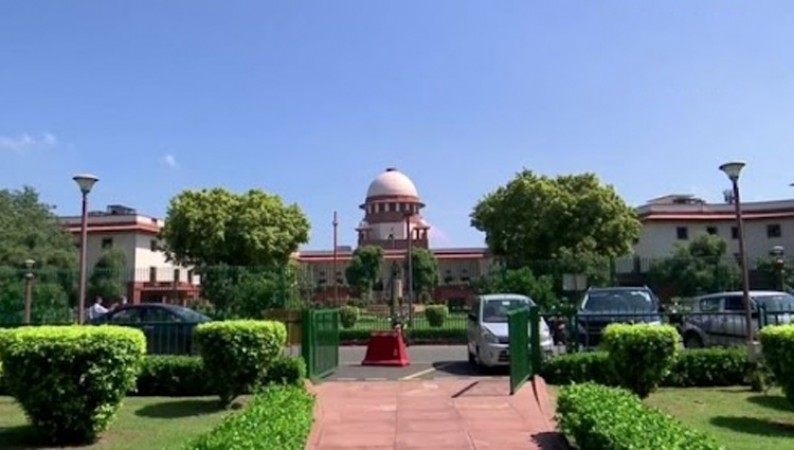
NEW DELHI: On the day of Monday, under the purview of the Supreme Court of India, the Chief Justice, DY Chandrachud, conveyed that Article 35A of the Constitution of India, which was annulled in the year 2019, had the effect of divesting fundamental rights. This pronouncement was rendered within the context of the ongoing deliberations regarding a plea contesting the revocation of the special status of the region of Jammu and Kashmir. A bench of the Supreme Court, consisting of Chief Justice DY Chandrachud and Justices Sanjay Kishan Kaul, Sanjiv Khanna, BR Gavai, and Surya Kant, convened for the eleventh successive day to continue the hearings concerning petitions challenging the decision of the central government to abrogate the distinctive status of Jammu and Kashmir by diluting Article 370 and Article 35A.
In the year 2019, the Union Home Minister, Amit Shah, presented a proposal for the repeal of Article 370 and Article 35A. Subsequently, the then President, Ram Nath Kovind, issued an order, referred to as the "Constitution (Application to Jammu and Kashmir) Order, 2019," stipulating that the provisions of the Indian Constitution would henceforth be made applicable to the region of Jammu and Kashmir. This measure, as assessed by experts, brought the northern state into alignment with the legal framework governing the remaining states of India.
In the year 2019, the President of the Jammu and Kashmir People's Democratic Party (PDP), Mehbooba Mufti, along with other prominent leaders of the party, was placed under preventative house arrest. This action coincided with the imposition of a state of lockdown in Jammu and Kashmir due to the eruption of tensions within the region. The populace engaged in demonstrations to protest the aforementioned decision.
Chief Justice Chandrachud's Observations on Article 35A
Amid the proceedings concerning the challenges to the abrogation of Article 370, the issue pertaining to the elimination of Article 35A was raised. On the day of Monday, Chief Justice Chandrachud highlighted that Article 35A had the effect of negating three fundamental rights. He elucidated, "The provision for employment under the auspices of the State government is explicitly outlined within Article 16(1)...While on one hand, the protections enshrined in Article 16(1) were upheld, Article 35A directly deprived individuals of the fundamental right vested therein, while simultaneously bestowing immunity against any legal challenge predicated on the assertion that it would result in the deprivation of a fundamental right enshrined under Article 16."
Continuing this discourse with Solicitor General Tushar Mehta, Chief Justice Chandrachud expounded, "With the introduction of Article 35A, three distinct fundamental rights were forfeited - namely, Article 16(1), encompassing the right to public employment; the right to acquire immovable property, a prerogative hitherto protected under 19(1)(f); and Article 31, relating to settlement within the state, which was previously safeguarded under 19(1)(e)."
Chief Justice Chandrachud further delineated, "Article 35A establishes exceptions within the ambit of three domains - namely, employment under the State government, acquisition of immovable properties, and settlement within the State."
Solicitor General Tushar Mehta, during the deliberations concerning Article 35A, posited that this provision posed an impediment to the progress of Jammu and Kashmir. He submitted before the court that the revocation of Article 35A facilitated economic "investment" within the state. This was especially crucial as the primary sources of revenue for the state included tourism and a limited number of cottage industries.
He asserted, "This measure brought the state on par with other citizens of the country. Prior to this, there was a prevailing conviction that Article 370 was not obstructive to progress and could not be rescinded. Regrettably, this perception persisted. However, following the elimination of Article 35A, investments have commenced to flow. The central government has taken charge of policing. Tourism has been revitalized, with a notable influx of 1.6 million tourists contributing to employment generation on a significant scale."
An Overview of Article 35A
Article 35A of the Constitution of India conferred authority upon the legislative body of the state of Jammu and Kashmir to define the classification of "permanent residents" of the state and to extend specialized rights and privileges to this subset of individuals. These privileges encompassed the ability to procure land and real property, the eligibility to participate in electoral processes and contest elections, the entitlement to seek employment within the government, and the eligibility to access additional state benefits such as advanced education and medical care.
Conversely, non-permanent residents of the state, irrespective of their Indian citizenship, were precluded from accessing these designated "privileges." Article 35A explicitly prohibited individuals from external to Jammu and Kashmir (who lacked permanent residency status) from securing government employment or acquiring property within the state.